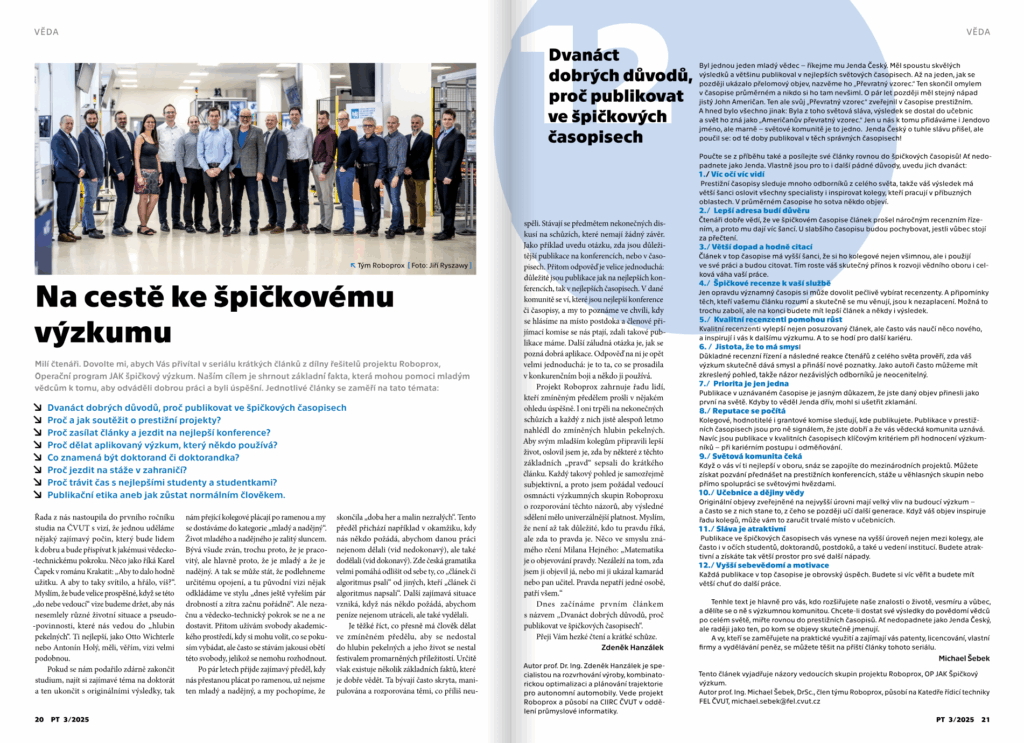Young Researcher’s Compass
Guiding Your Path to Excellent Research
ROBOPROX research leaders initiated a series of practical insights and proven advice from leading ROBOPROX researchers to guide early-career scientists on their path to success and excellent research.
Hands-on guidelines will be regularly published in the printed magazine of Czech Technical University “Pražská technika”.

The goal of this endeavour is to summarise the basic facts that can help young scientists do good work and be successful. The individual articles will focus on the following topics:
- Twelve good reasons to publish in top journals.
- Why and how to compete for prestigious projects?
- Why submit articles and attend the best conferences?
- Why do applied research that someone will use?
- What does it mean to be a doctoral student?
- Why go on internships abroad?
- Why spend time with the best students?
- Publication ethics, or how to remain a normal person.

#1 Twelve good reasons to publish in top journals (by MichaEl Šebek)
Published in Pražská Technika 03/2025 (12 June 2025)
Once upon a time, there was a young scientist – let’s call him Jenda Český. He had many great achievements and published most of them in the world’s best journals. Except for one, which later turned out to be a groundbreaking discovery, let’s call it the “Revolutionary Formula”. It ended up by mistake in a mediocre journal, and no one noticed it there. A few years later, a certain John American had the same idea. However, he published his “Revolutionary Formula” in a prestigious journal.
And suddenly everything was different: it brought him worldwide fame, the result made it into textbooks, and the world knows it as “American’s Revolutionary Formula”. Only in our country do we add Jenda’s name to it, but in vain – the global community doesn’t care. Jenda Český lost this fame, but he learned his lesson: since then, he has published in the right magazines!
Learn from this story and send your articles straight to top magazines! Don’t end up like Jenda. In fact, there are other compelling reasons for this, and I will list twelve of them:
1. More eyes see more: Prestigious journals are read by many experts from around the world, so your results have a better chance of reaching all specialists and inspiring colleagues working in related fields. In an average journal, hardly anyone will discover them.
2. A better address inspires confidence: Readers are well aware that articles in top journals have undergone a rigorous review process, so they are more likely to give them a chance. With weaker journals, they will doubt whether they are even worth reading.
3. Greater impact and many citations: An article in a top journal has a better chance of not only being noticed by colleagues, but also being used in their work and cited. This increases your actual contribution to the development of the scientific field and the overall weight of your work.
4. Top-notch reviews at your service: Only a truly significant journal can afford to carefully select reviewers. And the comments of those who understand your article and really devote themselves to it are priceless. It may hurt a little, but in the end you will have a better article and sometimes even a better result.
5. Quality reviewers will help you grow: Quality reviewers will not only improve the article under review, but will often teach you something new and inspire you to further research. And that’s good for your future career.
6. Certainty that it makes sense: A thorough review process and subsequent feedback from readers around the world will verify whether your research really makes sense and brings new insights. As authors, we can often have a biased view, so the opinion of independent experts is invaluable.
7. There is only one priority: Publication in a reputable journal is clear proof that you were the first in the world to make the discovery. If Jenda had known this earlier, he could have saved himself the disappointment.
8. Reputation counts: Colleagues, reviewers, and grant committees keep track of where you publish. Publications in prestigious journals are a signal to them that you are good and that you are recognized by the scientific community. In addition, publications in high-quality journals are a key criterion in the evaluation of researchers—both in terms of career advancement and remuneration.
9. The global community is waiting: When the best in the field know about you, it is easier to get involved in international projects. You may receive invitations to lecture at prestigious conferences, internships with renowned groups, or direct collaboration with global stars.
10. Textbooks and the history of science: Original discoveries published at the highest level have a major impact on future research – and often become the basis for what future generations learn. If your discovery inspires a number of colleagues, it can guarantee you a permanent place in textbooks.
11. Fame is attractive: Publications in top journals will elevate you to a higher level not only among your colleagues, but often also in the eyes of students, doctoral students, postdocs, and institutional leaders. You will become attractive and gain more space for your future ideas.
12. Higher self-confidence and motivation: Every publication in a top journal is a huge success. You will have more confidence and be more eager to continue your work.
This text is mainly for those of you who are expanding our knowledge of life, the universe, and everything, and sharing it with the research community. If you want to bring your results to the attention of scientists around the world, aim straight for prestigious journals. Don’t end up like Jenda Český, but rather like the person after whom discoveries are actually named.
And those of you who focus on practical applications and are interested in patents, licensing, owning companies, and making money can look forward to the next articles in this series.
Author Prof. Ing. Michael Šebek, DrSc., member of the Roboprox team, works at the Department of Control Engineering, FEE CTU – Faculty of Electrical Engineering, Czech Technical University in Prague, michael.sebek@fel.cvut.cz.

